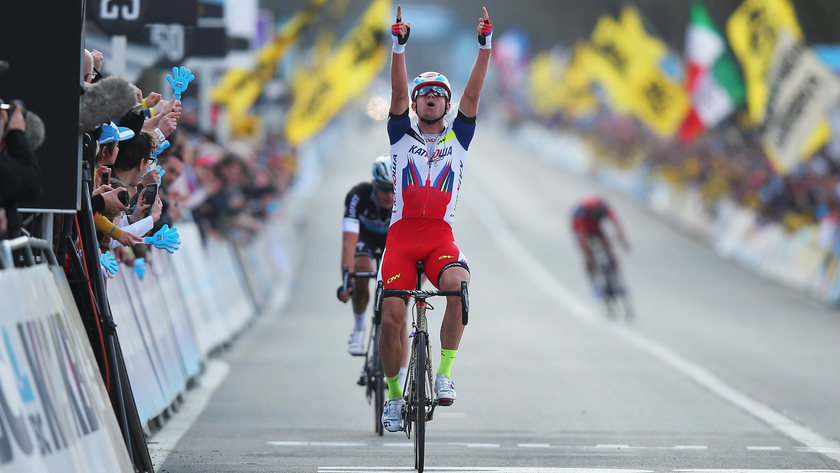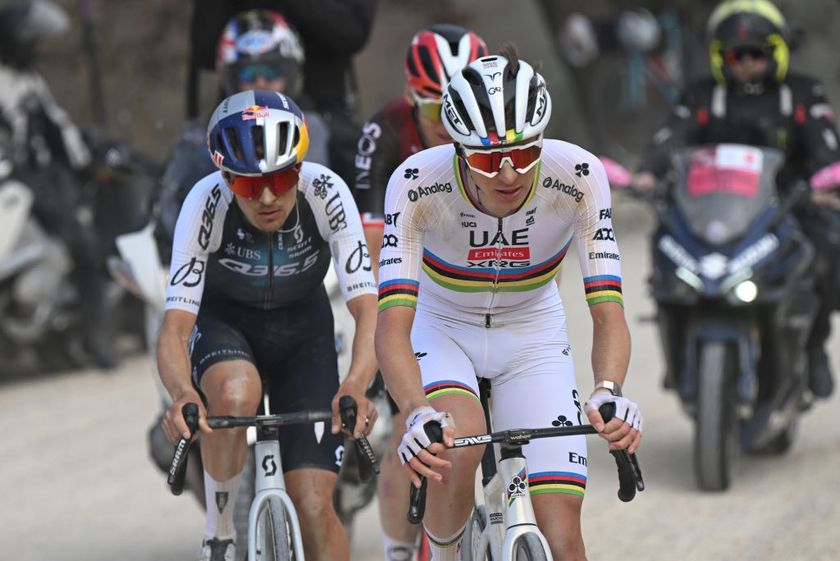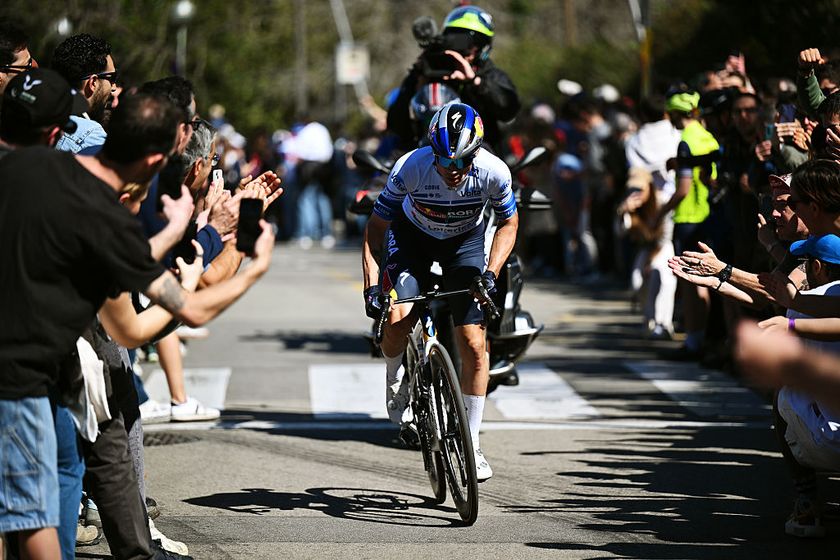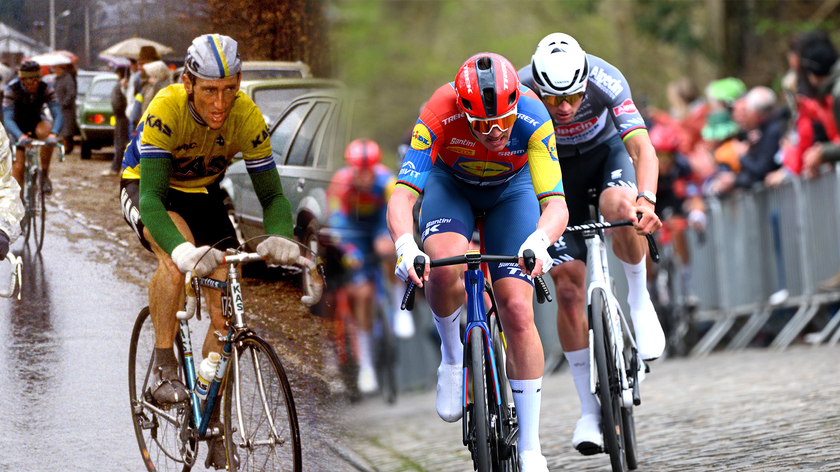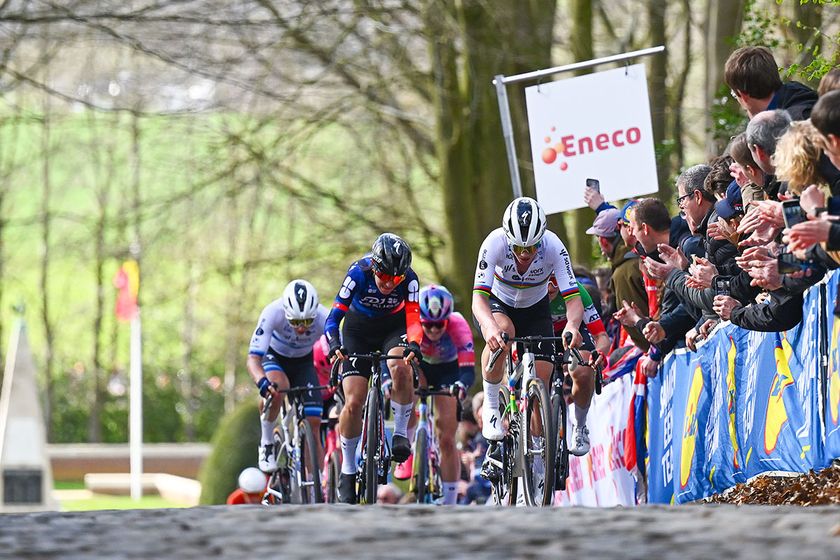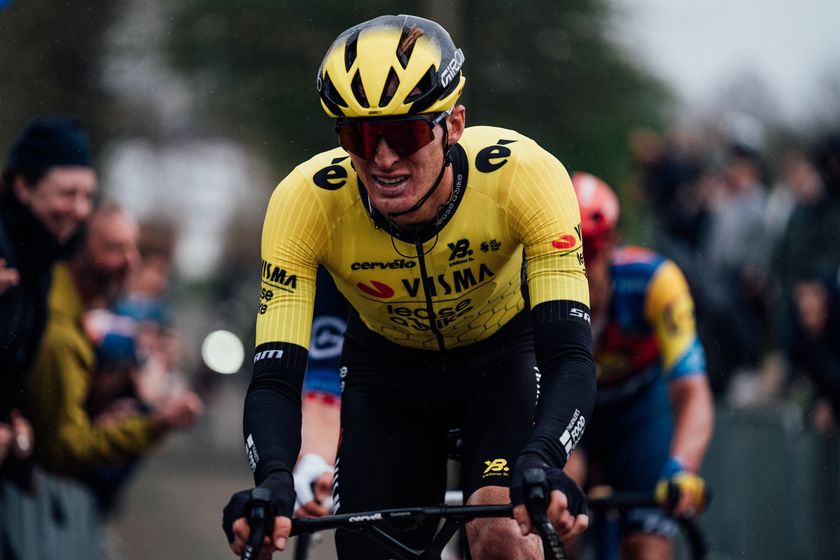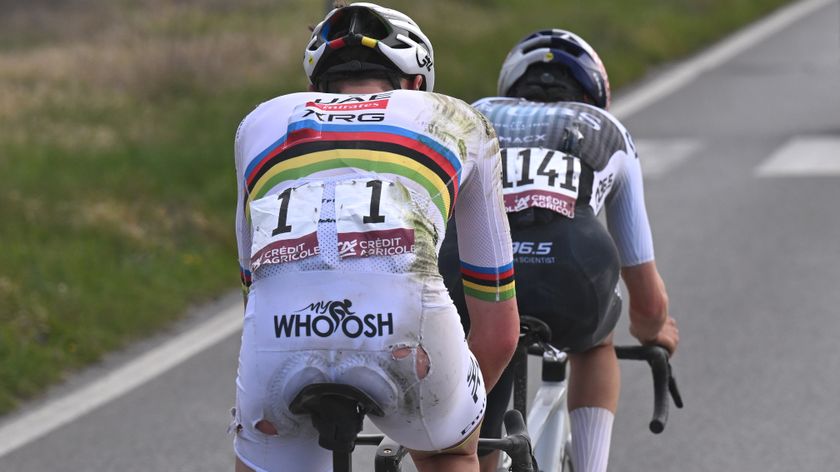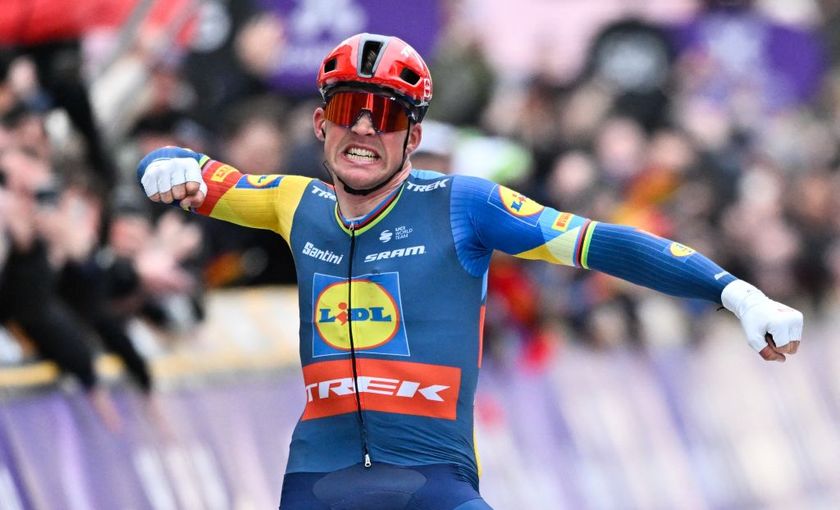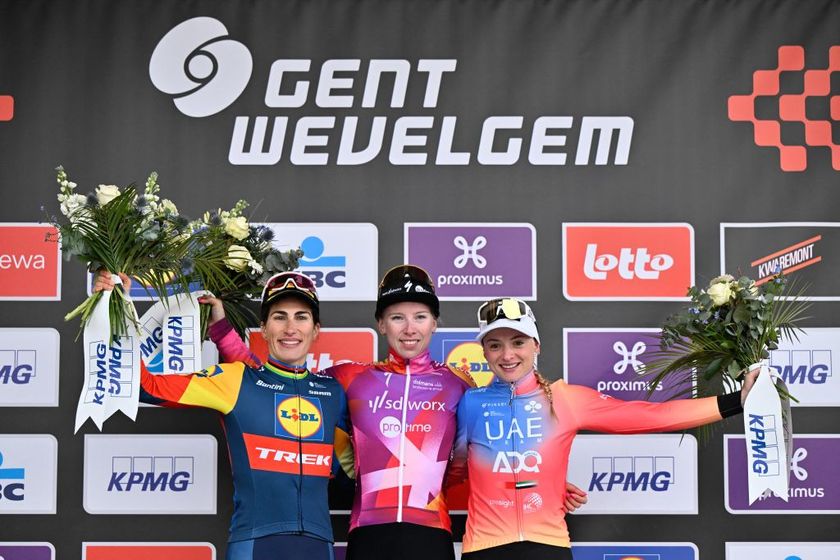The Son Also Shines
While it is no means assured that talent will be passed down through the generations, there are...


An interview with Nicolas Roche, January 11, 2005
While it is no means assured that talent will be passed down through the generations, there are enough incidences of this in cycling to take note. Of the current crop, riders such as Axel Merckx, Frank Vandenbroucke, Cedric Vasseur, Miguel Martinez and Bradley Wiggins (to name but a few) each have a history of cycling excellence in their families. Now, 20 year-old Nicolas Roche is pursuing his own pro dream, graduating to the peloton 24 years after his father Stephen began his own career with Peugeot.
Like his Tour-winning dad, Nicolas started out playing football, but the bike soon became the main focus of his energies. Living in Juan les Pins, near Nice, he's been competing with the VC La Pomme-Marseilles team for the past few seasons, and is progressing well. He dominated the M. Donnelly Junior Tour of Ireland just under two and a half years ago, then rode strongly in the Zolder world championships. 2003 was his first year as a senior but he posted several decent rides, including 29th place in the under 23 world championships in Hamilton.
This season was better again, with a consistent stream of placings in France, a bronze medal in the Irish road race championship and then an excellent tenth place in the GP d'Isbergues while on a pro trial with the Cofidis team. That ride was enough to earn him a two-year deal with the French squad, and he will make his debut on February second in the Etoile de Bessèges.
As the youngest rider on the team, Roche junior represents a new beginning for Cofidis. He's part of the new breed which the squad hopes will avoid the pitfalls of Millar, Gaumont et al; indeed, he welcomes the battery of tests which he will be exposed to as part of the team, talking positively about the hair and blood tests he and the other riders were required to undergo at Cofidis' recent training camp.
'For a neo-pro coming into the world of professional cycling, it is very reassuring,' he says. 'Even though the first thing you think of is the fact you are going to get some of your hair cut away, it is really reassuring because you know you're going to get hair tests, blood tests, the works. That's a good thing.'
'So far, things seem to be very good with the team. They are very serious, very 'pro', but also very relaxed. For example, when we were down at the training camp in Montpellier, there was a day when there was really strong rain. They said: "no problem, leave it. You can have a free afternoon." They gave us a loan of a car and we went for a spin in the city centre. You don't see that in every team - a lot of teams were probably out on the bike, in the rain. They are very comprehensive and very open, you can speak with them. There was also a great atmosphere with the riders...'
Get The Leadout Newsletter
The latest race content, interviews, features, reviews and expert buying guides, direct to your inbox!
Roche has a mature approach to his first season. His main goal is to satisfy the team, be that by helping others to win or taking decent placings himself. A possible start in ProTour events in June and August will help him in his apprenticeship; short-term, he's set a target of landing a pro win before his current two-year deal ends. And further ahead? Well, he's not quite sure what he can achieve in the sport, but if he has inherited even some of his father's strength and tactical savvy, he should carve out a very decent pro career...
Cyclingnews: What have you been up to since the world championships?
Nicolas Roche: Well, I had tendonitis in my knee after Verona... I was out for about two weeks. I started doing running after that and then I strained my ankle! It is actually an old injury that came back so that meant another five or six days off.
It was just a small problem but I couldn't do anything - it swelled right up. After that, I started to go back on the bike a bit. I wasn't doing much... I was working in the morning in my dad's hotel in Nice and then the afternoon I would do an hour or two hours easy, just spinning along the seafront with some cyclo-tourist friends.
I went to the Cofidis training camp in Amiens two weeks ago. It was good. It was mainly paperwork and other things, getting measured up for suits for the team presentation and all the cycling gear. We had photos taken as well. Also, we had drug tests there as well, the hair test.
CN: Is that every team, or just Cofidis?
NR: I am not sure... I know Cofidis does it anyway, because I got my hair cut! I think this was especially for Cofidis because I think they really want to get a new image and so they are doing what they can (to eliminate doping). For a neo-pro coming into the world of professional cycling, it is very reassuring. Even though the first thing you think of is the fact you are going to get some of your hair cut away, it is really reassuring because you know you're going to get hair tests, blood tests, the works. That's a good thing.
Also, we have a psychologist who works with us. In fact, there were two psychologists with us down at the camp. We have five meetings with each of them during the year: one every two months, basically, then the end of the year they give you a result of what they searched for. So it was really good.
CN: How does the hair test work?
NR: They cut five different strands of hair. We have another one to do in January.
CN: How did you find the guys in the team, the management, the staff? What was your first impression?
NR: They are very serious, very 'pro', but also very relaxed. For example, when we were down at the training camp in Montpellier, there was a day when there was really strong rain. They said 'no problem, leave it. You can have a free afternoon.' They gave us a loan of a car and we went for a spin in the city centre. You don't see that in every team - a lot of teams were probably out on the bike, in the rain. They are very comprehensive and very open, you can speak with them. There was also a great atmosphere with the riders... During the camp we would go for a four or five-hour spin in the morning and then do go-karting or do Laser Quest in the afternoon.
CN: Who was the wizz at go-karting in Cofidis?
NR: It was (Sylvain) Chavanel... he was pretty good...
CN: And how was your own go-karting? Your dad did a bit of rallying a few years ago...
NR: I was good enough, I got third. Not too bad. Jimmy Casper was second. The whole team wasn't there... There were 12 of us. There were only 17 in the training camp. But it was part of the getting together and it was good fun. It was not an officially organised thing, we just went out together. Some of the staff were there too.
One night we had presentation thing - it was in a hotel so obviously there were other guests there and people from a seminar. Everybody from the team had to stand up on a chair and list their qualities, their faults, their ages and give a brief history. You also had to stand up there and sing a song! I sang some French kiddies' song (laughs).
CN: Were you nervous doing it?
NR: No, I'm not that type... I am always there for a good laugh so I didn't care. On the last day they did something else... they said the two neo-pro's have to be part of a joke. It was the same thing, in the middle of the restaurant, sitting on a chair. They said, 'take your T-shirt off', so I did that. You have to picture this - there were people in the restaurant looking on. They told me and the other neo-pro to move a little away from the table, then they started squashing eggs onto our heads. So it was a good laugh. It was not bad... At first they told us that we would have to do a joke, but if we did the joke they would buy us a drink after dinner. So we did it... It was a bit of crack, nothing serious. Sometimes when tricks are played on neo-pros, it is a bit different... It is like when you're in school with the first years and the second years. This was more for the crack, there was nothing bad in it.
CN: Presumably you met some of the guys already when you did your stagiaire back in September?
NR: Yes, there were a good few riders from then all right. The training camp in Amiens was to get to know each other - when you are cyclists, you really get to know each other on the bike as well.
CN: You did a proper training camp in Montpellier recently. How were you going there? You had missed a little bit of training with your tendonitis, so was your condition down a bit?
NR: It was good, because most of the pros finish the season late. But for once this year I ended my season early as I finished after the worlds... The tendonitis happened during the two weeks I would have been off the bike anyway, so it was no bother at all. My condition felt good - I was really surprised because normally I don't get condition until late December. So it is a month and a half, nearly two months, earlier than usual. I was very happy, I was not getting dropped, I was staying in the wheels. As it was a training camp, we were sort of playing the bike as well, attacking each other and all that. It was really good fun. I enjoyed the camp.
CN: What is your training programme like between now and the start of the season?
NR: Well, obviously it is starting to pick up now a bit. I am starting with the Etoile de Bessèges on the second of February. I'm not going to do the Tour, so I will try to be in form for the early part of the season - March, April, May. I am not too sure about the programme, but for the moment I know I am doing Bessèges and a couple of races in Belgium as well. I don't want to get dropped in those so I am going to do the training correctly!
CN: Have you been told that you're going to do some of the ProTour races, or will that be left until next season?
NR: No, I think I could be doing some in June and some in August. Obviously the team that is going to do the Giro is going to be a bit tired and the team that is going to do the Tour is going to be in preparation for that, so I will be fitting into the empty spaces. Also, if there is an injury to a rider during the year, I could be called on to do one to. Obviously, I'm not going to do a lot of them because it is my first year and I am the kid of the team...
CN: Are you the youngest?
NR: By far! The second youngest is two years older, and the next is another two or three years older again. It is a pretty old team - I think the average age is about 28.
CN: Looking back at last year, what for you were the key performances?
NR: Well, I think second overall in the Tour de Loire et Cher was pretty important. I think I was able to do a good season, but unfortunately I didn't win so I am a bit disappointed with that. I did very well in all of my races but I never won one. I think I have eight or nine second places in the year, but only two wins - a team time trial and an individual time trial. So that is my one regret, that I didn't win a proper road race on my own.
But I think the Tour de Loire et Cher was important, as was Paris-Mantes... even if I was eighth. I did a really good race that day, I was up there for the whole race, and only got caught in the last kilometre. Finishing tenth in the Grand Prix Isbergues during my trial with Cofidis was important... They didn't see me doing the other races, but that was good enough for them. Up to that point, they haven't actually been too happy because I wasn't doing that well in the other stagiaire races - I was very tired in August, so I was almost three weeks of the bike. I had almost a month without any races when I started the trial with them. It wasn't the most ideal preparation!
CN: Was the GP Isbergues the final race of your trial with them?
NR: It was the actual last race I did as stagiaire... obviously all the races during my stage were important but this one, as my last one, was crucial to show them what I was capable of. They could only judge me on the races I did before. I wasn't very strong in those, but then the directeur realised that he made me do six races in less than 10 days. I was racing every second day and I was the only one doing that, because the team was going home and there was always a different team. Some of the riders did three races or four races but I was the only one to do the full lot. The guy realised that and said okay, realising that I hadn't raced before the trial started and then he made me do six races in less than 10 days. Obviously, I was not going to be at my best.
CN: So did you get a break after those six races, to give you time to prepare for Isbergues, or is just that your legs clicked on the day?
NR: Well, I was getting better and better each day. I did two races the same week as Isbergues, so I didn't have time to rest. I didn't even go home, I just went from one hotel to the other.
CN: You attacked in the closing stages of Isbergues?
NR: Yeah, I did, yeah. I was on my own for about three kilometres, and I was caught with about two and a half to go. That was important because it showed I had something left.
During the race, the directeur sportif came up to me and said: 'don't ride too hard, don't ride too hard, the end is difficult'. He was surprised that I went clear, but I knew that if I had the legs, I was capable to follow any race. I could be there at the end as it was my type of race. If that had been an amateur race, it would have been ideal for me. I knew it suited me so I really wanted to do something special.
I got into the front group but then, with about 50 kilometres to go, we only had about two minutes. Everybody thought we were going to get caught, but we really put the hammer down again and that woke us up. We did the last 50 kilometres with less than two minutes, but stayed clear as everybody got motivated again. We had been motivated, but when you are clear a long time you can settle into a false rhythm. But when we saw the sign coming up, saying that we had only two minutes, we really knuckled down again.
Near the end, the directeur sportif said to me: 'now, Nicolas, you have nothing to lose. If it comes to a sprint you are not going to win anyway, so you may as well have a go if you have the legs.' So I gave it a go. I was happy to as well because it showed something... My move was the longest solo break from the group. The last 15, 20 kilometres had just been attacking, attacking, but nothing had gone clear. I didn't stay away until the finish but my attack showed I was strong.
CN: What would you say your qualities are as a rider?
NR: I would say I am an all-rounder - I'm not a climber, I'm not a pure rouleur, I just go anywhere. I think it is more in the head, I have a strong head. I'm not afraid of attacking.
CN: When you look at your father, and his career, do you consider yourself a different type of rider?
NR: I would say that he calculated more. That probably comes with the experience. I kind of listen too much to the legs and not enough to the head, sometimes, and that has probably cost me a few wins this year.
CN: Looking ahead, what ambitions do you have for 2005?
NR: Well, the first one of course is to be able to please the team. They are the reason I have a contract, so the first priority is to please them. So if they want me to finish the race in the top 10 and I am able to do that, good. If they say they want me to do something else, I will do that too. Of course, all the races are not going to be like GP Isbergues, but I would like to get two or three good results in the year.
CN: And longer-term, what would you like to do?
NR: That is a hard question! (laughs). I would hope to get a win in the next two years, so that will be my semi-long term aim. I would like to do that before my present contract ends.
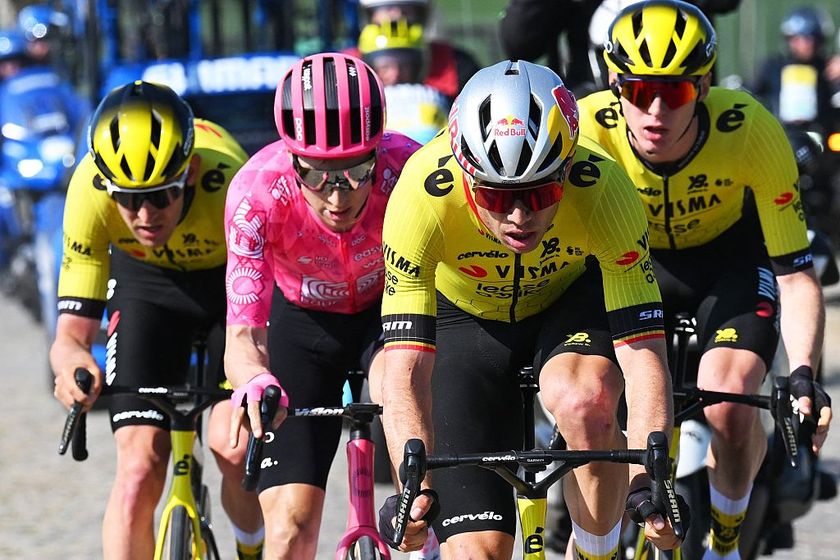
Eyewitness – Tactical blunder turns Wout van Aert and Visma-Lease a Bike's 'perfect' day at the Classics into a nightmare
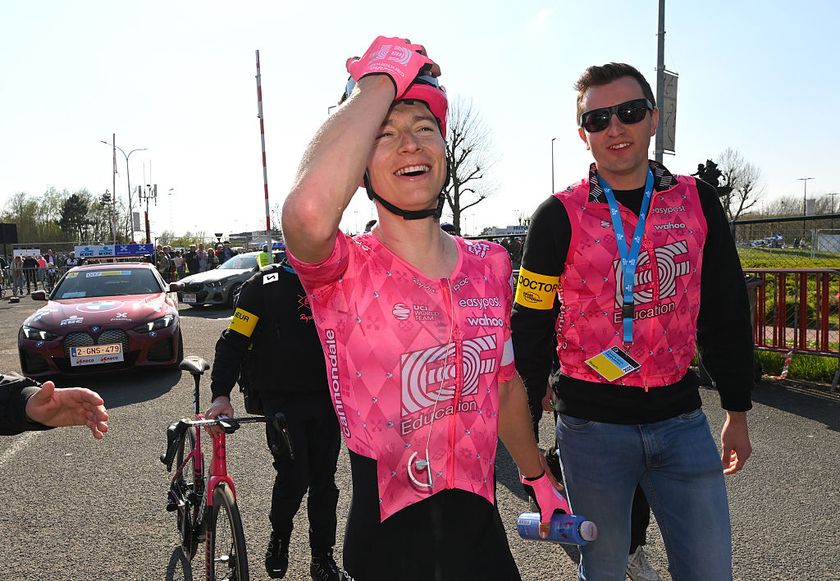
'A ton of weight was lifted off my chest' - Neilson Powless proves his one-day race prowess with Dwars door Vlaanderen win
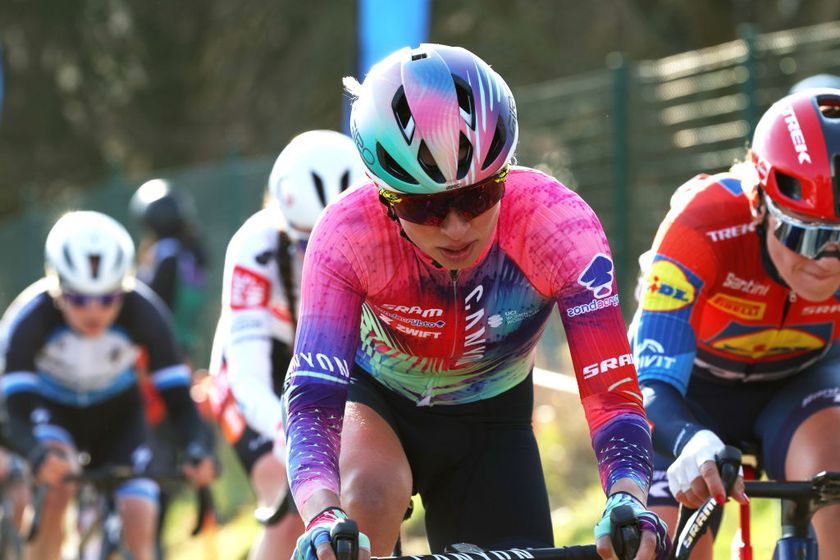
'A bummer to be dropped' - Kasia Niewiadoma 'unsatisfied' with Dwars door Vlaanderen result but sees positive signs for Flanders
